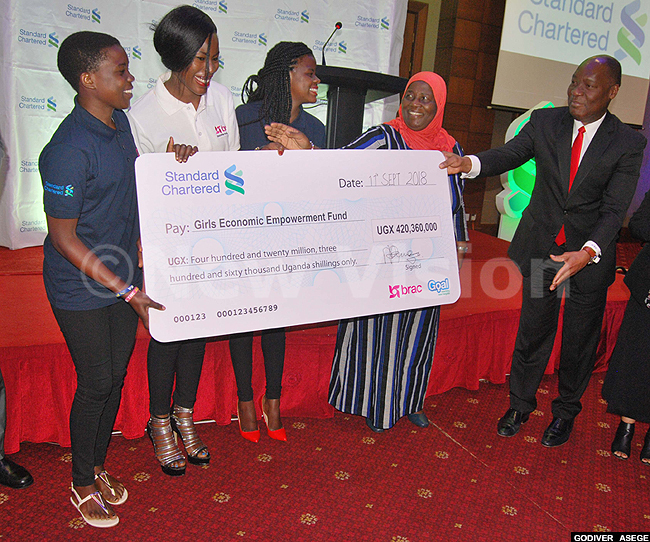Empowering the girl child economically
Sep 13, 2018
In the initiative, as many as 3,000 girls will be skilled in entrepreneurship and financial management.

PIC: From left, BRAC adolescent mentor Sheila Namuddu and Brac Goal coach Rosette Birungi explaining their projects to StanChart CEO Phillip Wafula Albert Saltson and gender minister Janat Mukwaya in Kampala on Tuesday. (Credit: Godiver Asege)
EMPOWERMENT
KAMPALA - Up to 250 out-of-school girls aged 19-22 years are set to receive business start-up capital from a sh420m girl-centred economic empowerment initiative.
Additionally, 3,000 girls will also be skilled in entrepreneurship and financial management in the same drive that aims at financially empowering vulnerable girls.
Funded by Standard Chartered Bank and implemented by BRAC Uganda, the initiative, dubbed the Goal Programme, empowers girls through sports and life skills training.
Speaking at the fund's launch in Kampala, Hasina Akhter, the country representative of BRAC Uganda said the intervention is timely and necessary.
"We are witnessing increasing numbers in of school dropout rates of girls and child marriages due to the poverty that their families are facing," said Akhter, adding that such a trend is not only dangerous for the girls' health, but also their life and future at large.
StanChart's chief executive Albert Saltson said providing girls with the tools to shape their future has an incredible multiplier effect on economic growth.
"Investing in girls can result in increased prosperity and diversity," he said.
Gender equality is critical to economic growth, added Saltson.

The initiative to empower the girl child is worth sh420m
A 2017 European Institute for Gender Equality report suggests that gender equality is good for the economy and it cannot be disregarded if a country wants to achieve sustainable and inclusive growth.
In her remarks, Janat Mukwaya, the gender, labor and social development minister, commended the private sector and civil society for augmenting government initiatives.
"It is gratifying to note that this programme is in line with the sustainable development goals and the second national development plan," she said.
The minister underlined the relevance of human capital development in the country's economic growth.
She further highlighted that the Goal programme is aligned to the current social development sector plan, which seeks to empower communities through reaching out to the vulnerable and marginalised groups for inclusive financial growth.
Inaugurated in Uganda in 2014, the Goal programme has reached over 23,000 girls.
Immaculate Basemera, one of the Goal beneficiaries from Nakifuma in central Uganda, opened up a beauty salon using a start-up kit she got last year.
"After the skills and financial training, I wrote a business proposal which was accepted," she said..
With four young women employees, Basemera has not only provided employment, but she has also contributed to the multiplier effect of economic growth.
